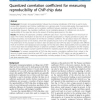Free Online Productivity Tools
i2Speak
i2Symbol
i2OCR
iTex2Img
iWeb2Print
iWeb2Shot
i2Type
iPdf2Split
iPdf2Merge
i2Bopomofo
i2Arabic
i2Style
i2Image
i2PDF
iLatex2Rtf
Sci2ools
114
click to vote
BMCBI
2010
2010
Quantized correlation coefficient for measuring reproducibility of ChIP-chip data
Background: Chromatin immunoprecipitation followed by microarray hybridization (ChIP-chip) is used to study protein-DNA interactions and histone modifications on a genome-scale. To ensure data quality, these experiments are usually performed in replicates, and a correlation coefficient between replicates is used often to assess reproducibility. However, the correlation coefficient can be misleading because it is affected not only by the reproducibility of the signal but also by the amount of binding signal present in the data. Results: We develop the Quantized correlation coefficient (QCC) that is much less dependent on the amount of signal. This involves discretization of data into set of quantiles (quantization), a merging procedure to group the background probes, and recalculation of the Pearson correlation coefficient. This procedure reduces the influence of the background noise on the statistic, which then properly focuses more on the reproducibility of the signal. The performanc...
Related Content
| Added | 08 Dec 2010 |
| Updated | 08 Dec 2010 |
| Type | Journal |
| Year | 2010 |
| Where | BMCBI |
| Authors | Shouyong Peng, Mitzi I. Kuroda, Peter J. Park |
Comments (0)

